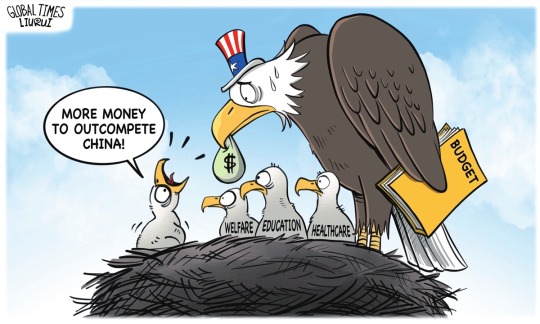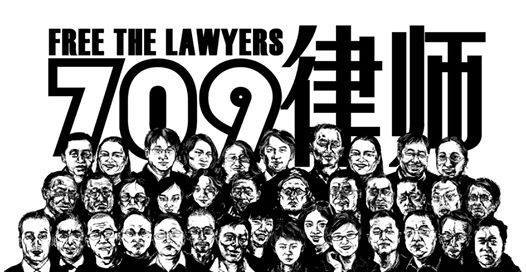#chinas-crackdown
Text
BAD thing about moving back home not including finding a car an apartment and a new phone number is finding a JOB. here are my options
entry-level admin/human resources job (over-qualified for this tbh but it's an easy office job)
bartender/waitress (tip money is tempting but customer service fatigues the brain whether u like it or not)
behavioral therapist/health technician (low pay, hard and sometimes dangerous work but looks good for applying to doctoral programs and it's more meaningful than sitting at a desk)
#although I'll be doing a long internship anyway before i finish this master's so might as well not torture myself#what other jobs are there#i considered online esl teaching but those jobs pay so little#and with the crackdown from china companies arent hiring
6 notes
·
View notes
Text
Misplaced Priorities
— Liu Rui | March 12, 2024

Illustration: Liu Rui/Global Times
Preying On The World
— Liu Rui | March 11, 2024

Illustration: Liu Rui/Global Times
Overlooking Principles
— Liu Rui | March 10, 2024

Illustration: Liu Rui/GlobalTimes
US’ Crackdown On TikTok Tramples Upon First Amendment Rights
— Carlos Latuff March 08, 2024

Cartoon: Carlos Latuff
#Miscellaneous Cartoons#China 🇨🇳#United States 🇺🇸#Cartoonists#Liu Rui#Carlos Latuff#TikTok#First Amendment Rights#Overlooking Principles#Preying On The World 🌎#Misplaced Priorities#US’ Crackdown On TikTok
0 notes
Text
the hugo awards scandal just got a billion times more racist good lord
#laughs awkwardly#these western administrators going Ohh we are hosting in a Repressive Country we must Prevent Issues via Self Censorship#genuinely it's possible they did this for no reason. now the ccp gov is embarrassed and chinese fandom is worried about crackdown for it#who did this benefit lmao. this is such a mess. literally feels like westerners who don't have any experience with censorship were just#blindly swinging for Possible Problematic Works without any understanding of how censorship actually benefits the state#all the emails going is this an issue? i don't know what's an issue in china. is this a politics? i don't know what will get us in trouble#like a bunch of people self censoring for the sake of business interests but were too ashamed of it to outright google What Is Banned
0 notes
Text
2015-709 crackdown

The 709 Crackdown (Chinese: 中国709维权律师大抓捕事件; pinyin: Zhōngguó 709 wéiquán lǜshī dàzhuābǔ shìjiàn; lit. 'China 709 mass arrest of civil rights lawyers incident' or 709案 '709 Case' for short) was a nationwide crackdown on Chinese lawyers and human rights activists instigated during the summer of 2015. It is known as the "709 crackdown" as it started on 9 July 2015.[1]
Yaqiu Wang of Human Rights Watch commented that "the 709 crackdown dealt a terrible blow to China's rights-defense movement, which significantly contracted as rights lawyers were jailed, disbarred or placed under surveillance".
0 notes
Text
2023 Jojo Olsson: Wishful Thinking About China
This is a thought provoking overview Jojo Olsson on the AXESS/Stockholm website in Swedish. The change in attitudes towards China under during Secretary Xi’s decade thus far has been sharp. Expecting/hoping that China could make a transition to genuine democracy in the past wasn’t actually wrong.
Pressure for closer engagement with China has often been led by business successfully countering…

View On WordPress
#China#crackdown#democracy#economy#Frank Dikötter#politics#PRC#repression#Susan Shirk#Sweden#Xi Jinping#中国
0 notes
Text
Mr president Xi sir please expand your targeted crackdown on online gambling and microtransactions and imprison all csgo skin investors, Mr president Biden sir please extradite all csgo gambling site owners to China to face capital punishment 🫡🇺🇲🫡🇨🇳
730 notes
·
View notes
Note
why should I care that the ccp is collecting my data?
If we exclude the concept that TikTok could be accessing data on your phone that it isn't supposed to get without permission (contact data, health data, whatever) I think there's a lot of triangulation that could be done to narrow down your data to something very individual, right? Like, for example, your location data could be matched with your content to figure out things like "oh, you're recording this in front of a military base, now we can cross-reference that with what we already know about this nation's military capability" and so on.
I don't think most people operate in any sensitive areas when posting to tiktok, so that's kind of whatever, but... I don't know, maybe soldiers shouldn't use tiktok while on a military base or something. At least that's the best I can do when trying to come up with a specific reason here.
For me the catch is hey, sure, yeah, I don't want Bytedance to have a ton of personal data on me. But also I don't want fucking Facebook, Google, Amazon, Yahoo!, Ask Jeeves, RaytheonKidz.biz, or the United States fuckin' Government to have any of that data, either! Biden just issued an executive order this morning about personal data falling into the hands of "countries of concern" and motherfucker I'm like YEAH LIKE THE US OF FUCKIN' A, MAYBE? THE ONE I'M MOST CONCERNED ABOUT?
Like I don't want China or Russia getting their hands on a bunch of information about me, but in a world where US-based politicians are already attacking medical procedures and science to make things like gender-affirming care and abortion illegal, all that location data and content could have some very scary uses down the line. And that crackdown won't come from fucking China.
453 notes
·
View notes
Text
China tech investors are misinterpreting end of COVID lockdowns
China tech investors are misinterpreting end of COVID lockdowns
China tech investors are misinterpreting end of COVID lockdowns | Fortune
You need to enable JavaScript to view this site.
Source link

View On WordPress
#alibaba shares#China#china covid lockdown#china crackdown#china ends crackdown#china ends lockdown#china lockdown#china online retail#china recovery#china retail sales#china tech crackdown#china tech shares#Covid#hang seng index today#hang seng tech index#hang seng tech index today#investors#lockdowns#meituan shares#misinterpreting#shanghai ends lockdown#Tech#tencent shares
0 notes
Text
Investors shift from China to Southeast Asia, India amid crackdown on big tech
Investors shift from China to Southeast Asia, India amid crackdown on big tech
Investors shift from China to Southeast Asia, India amid crackdown on big tech
Beijing’s regulatory crackdown on tech companies has prompted startup investors to look for new markets in Southeast Asia including India. Wataru Suzuki, writing in Nikkei Asia said that venture capital (VC) firms that back startups in Southeast Asia and India are raising record sums for new funds.Southeast Asia- and…
View On WordPress
0 notes
Text
China revealed this week it aims to spend more than a billion dollars to bolster manufacturing and domestic tech in a bid to remain globally competitive, while divulging little new support for the struggling real estate market.
Industrial support clearly ranked first on Beijing’s priority list for the year ahead, according to three major plans released this week as part of China’s annual parliamentary meetings.
One of those reports, from the Ministry of Finance, said the central government would allocate 10.4 billion yuan ($1.45 billion) “to rebuild industrial foundations and promote high-quality development of the manufacturing sector.”
While that’s down from the 13.3 billion yuan earmarked for the same category last year, the sector overall gained greater prominence. In 2023, plans to spend on industrial development came second to support for consumption.
“Unlike other economies that went through a wrenching adjustment in their housing market, China’s investment rate isn’t falling,” HSBC’s chief Asia economist Frederic Neumann and a team said in a report Friday. “Instead, [capital expenditure] is shifting towards infrastructure and, importantly, manufacturing.”[...]
Chinese authorities in 2020 intensified a crackdown on real estate developers’ high reliance on debt for growth. Property sales have since plunged while developers have run out of money to finish many projects, cutting into what was once about 25% of China’s GDP when including related sectors such as construction.[...]
Despite widespread attention on whether Beijing would bail out the property sector, real estate got no mention in the finance ministry’s spending plans, and limited attention in a ministry-level press conference about the economy during the parliamentary meetings. Instead, the housing minister was included in the lineup for a press conference about people’s livelihoods.
“Supporting the modernization of the industrial system” came first in the finance ministry’s report, followed by “supporting the implementation of the strategy of invigorating China through science and education.”
Within that second priority, the finance ministry said it would allocate 31.3 billion yuan for improving vocational education. Amid high youth unemployment, especially for university graduates, electric car company BYD and battery maker CATL are among those working with vocational schools to train staff for their expanding workforce.[...]
The report from the National Development and Reform Commission, the top economic planner, reiterated government plans to support some developers’ financing needs — under the eighth item on the priority list that called for preventing financial risks. The government work report presented by Premier Li Qiang gave real estate a similar level of prominence.
8 Mar 24
China will improve home sales in a "forceful" and "orderly" way, Minister of Housing and Urban-Rural Development Ni Hong said on Saturday (Mar 9), as weak demand in the country's beleaguered residential property market persists.[...]
Some developers should be allowed to go bankrupt or restructured according to legal and market-based rules, Ni said told a press conference on the sidelines of the annual meeting of parliament in Beijing.
Premier Li Qiang said this week that China will quicken the development of "a new model" for the troubled sector, focussing on building more affordable housing and meeting demand for homes.
But China will insist that "housing is for living in, not for speculation" when formulating a new development model for the sector, Ni said, reiterating an official line against property speculation.
9 Mar 24
184 notes
·
View notes
Text
Because large-scale organising is “almost impossible” in China, women are turning to “all kinds of alternative ways to maintain feminism in their daily lives and even develop and transfer feminism to others,” she says. These may take the form of book clubs or exercise meet-ups. Some of her friends in China organise hikes. “They say that we are feminists, we are hiking together, so when we are hiking we talk about feminism.“ - Lü Pin
To find evidence that China’s feminist movement is gaining momentum – despite strict government censorship and repression – check bookshelves, nightstands and digital libraries. There, you might find a copy of one of Chizuko Ueno’s books. The 74-year-old Japanese feminist and author of Feminism from Scratch and Patriarchy and Capitalism has sold more than a million books in China, according to Beijing Open Book, which tracks sales. Of these, 200,000 were sold in January and February alone.
Ueno, a professor of sociology at the University of Tokyo, was little known outside in China outside academia until she delivered a 2019 matriculation speech at the university in which she railed against its sexist admissions policies, sexual “abuse” by male students against their female peers, and the pressure women felt to downplay their academic achievements.
The speech went viral in Japan, then China.
“Feminist thought does not insist that women should behave like men or the weak should become the powerful,” she said. “Rather, feminism asks that the weak be treated with dignity as they are.”
In the past two years, 11 of her books have been translated into simplified Chinese and four more will be published this year. In December, two of her books were among the top 20 foreign nonfiction bestsellers in China. While activism and protests have been stifled by the government, the rapid rise in Ueno’s popularity shows that women are still looking for ways to learn more about feminist thought, albeit at a private, individual level.
Talk to young Chinese academics, writers and podcasters about what women are reading and Ueno’s name often comes up. “We like-like her,” says Shiye Fu, the host of popular feminist podcast Stochastic Volatility.
“In China we need some sort of feminist role model to lead us and enable us to see how far women can go,” she says. “She taught us that as a woman, you have to fight every day, and to fight is to survive.”
When asked by the Guardian about her popularity in China, Ueno says her message resonates with this generation of Chinese women because, while they have grown up with adequate resources and been taught to believe they will have more opportunities, “patriarchy and sexism put the burden to be feminine on them as a wife and mother”.
Ueno, who found her voice during the student power movements of the 1960s, has long argued that marriage restricts women’s autonomy, something she learned watching her own parents. She described her father as “a complete sexist”. It’s stance that resonates with women in China, who are rebelling against the expectation that they take a husband.
Ueno’s most popular book, with 65,000 reviews on Douban, is simply titled Misogyny. One review reads: “It still takes a little courage to type this. I have always been shy about discussing gender issues in a Chinese environment, because if I am not careful, I will easily attract the label of … ‘feminist cancer’.”
“Now it’s a hard time,” says Lü Pin, a prominent Chinese feminist who now lives in the US. In 2015 she happened to be in New York when Chinese authorities arrested five of her peers – who were detained for 37 days and became known as the “Feminist Five” – and came to Lü’s apartment in Beijing. She narrowly avoided arrest. “Our movement is increasingly being regarded as illegal, even criminal, in China.”

China’s feminist movement has grown enormously in the past few years, especially among young women online, says Lü, where it was stoked by the #MeToo movements around the world and given oxygen on social media. “But that’s just part of the story,” she says. Feminism is also facing much stricter censorship – the word “feminism” is among those censored online, as is China’s #MeToo hashtag, #WoYeShi.
“When we already have so many people joining our community, the government regards that as a threat to its rule,” Lü says. “So the question is: what is the future of the movement?”
Because large-scale organising is “almost impossible” in China, women are turning to “all kinds of alternative ways to maintain feminism in their daily lives and even develop and transfer feminism to others,” she says. These may take the form of book clubs or exercise meet-ups. Some of her friends in China organise hikes. “They say that we are feminists, we are hiking together, so when we are hiking we talk about feminism.
“Nobody can change the micro level.”
‘The first step’
In 2001, when Lü was a journalist starting out on her journey into feminism, she founded a book club with a group of friends. She was struggling to find books on the subject, so she and her friends pooled their resources. “We were feminists, journalists, scholars, so we decided let’s organise a group and read, talk, discuss monthly,” she says. They met in people’s homes, or the park, or their offices. It lasted eight years and the members are still among her best friends.
Before the book club, “I felt lonely when I was pursuing feminism. So I need friends, I need a community. And that was the first community I had.” “I got friendship, I deepened my understanding of feminism,” Lü says. “It’s interesting, perhaps the first step of feminist movements is always literature in many countries, especially in China.”
Lü first read Ueno’s academic work as a young scholar, when few people in China knew her name. Ueno’s books are for people who are starting out on their pursuit of feminism, Lü says, and the author is good at explaining feminist issues in ways that are easy to understand.
Like many Ting Guo discovered Ueno after the Tokyo University speech. Guo, an assistant professor in the department of cultural and religious studies at the Chinese University of Hong Kong, still uses it in lectures.
Ueno’s popularity is part of a larger phenomenon, Guo says. “We cannot really directly describe what we want to say, using the word that we want to use, because of the censorship, because of the larger atmosphere. So people need to try to borrow words, mirror that experience in other social situations, in other political situations, in other contexts, in order to precisely describe their own experience, their own feelings and their own thoughts.”
There are so many people who are new to the feminist movement, says Lü, “and they are all looking for resources, but due to censorship, it’s so hard for Chinese scholars, for Chinese feminists, to publish their work.”
Ueno “is a foreigner, that is one of her advantages, and she also comes from [an] east Asian context”, which means that the patriarchal system she describes is similar to China’s. Lü says the reason books by Chinese feminists aren’t on bestseller lists is because of censorship.
Na Zhong, a novelist who translated Sally Rooney’s novels into simplified Chinese, feels that Chinese feminism is, at least when it comes to literature, gaining momentum. The biggest sign of this, both despite and because of censorship, is “the sheer number of women writers that are being translated into Chinese” – among whom Ueno is the “biggest star”.
“Young women are discovering their voices, and I’m really happy for my generation,” she says. “We’re just getting started.”
By Helen R Sullivan
This is the third story in a three-part series on feminism and literature in China.
#China#Japan#Chizuko Ueno#Books for women#Feminism from Scratch#Patriarchy and Capitalism#Misogyny#Feminist Five#Lü Pin#WoYeShi
667 notes
·
View notes
Text
Calls for Action, Call Your Reps: 2/13/24
This is USA-specific, as that is the place I live and know.
Find your elected officials.
Today, much of my information is coming from Democracy Now!, which I generally listen to as a podcast (functionally, it is a radio news broadcast, like NPR or BBC), and I am quoting from the text versions on their website.
The Senate passed a $95 billion military funding package for Ukraine, Israel and Taiwan in the pre-dawn hours this morning. But the bill’s fate remains unclear after House Speaker Mike Johnson dismissed the measure over its failure to include hard-line immigration restrictions. This comes after Johnson and other Republicans rejected an earlier version of the bill which did contain the border crackdown they had demanded. Johnson has told Republican congressmembers he will call a House vote on a stand-alone funding bill for Israel.
From the same page, we are hearing that President Biden is urging Israel to refrain from invading Rafah, where a million or so Palestinians are currently sheltering, but is not actually threatening any kind of repercussions for said invasion. Reports from both official sources (e.g. the Hamas-run health ministry) and less official (e.g. American doctors returning from relief services in Palestine) indicate that over half of the deaths in Palestine are children.
I am not going to pretend that I know what is going through Biden's head.
Both House and Senate:
Reinstate funding for UNRWA. While the claims made by Israel that employees of the relief agency were involved in Oct. 7th are troubling, THEY are not well supported, and western officials did not do their duty in investigating the claims before cutting funding. This arm of the UN is currently providing food, water, shelter, and medical care to the 2.3 million displaced peoples of Gaza. It is especially disturbing and concerning that the many children of Gaza, who are already suffering due to this conflict, are now having this support revoked. Many sources are also claiming that the evidence is flimsy at best.
Urge both Senate and House to refrain from funding Israel, or to at least put some strings on it. The IDF cannot be given funding without some regulations on what they can do with it. They have proven that they are unwilling to take steps to protect civilians.
FOR THE SENATE: Urge your senator to put their support behind Bernie Sanders and his motion to restrict funding to Israel until a humanitarian review of the IDF’s actions in Gaza has been completed. Cite it as Senate Resolution 504 if your Senator is right-wing enough to react negatively to the mention of Sanders by name. NOTE: This resolution was TABLED by the Senate on 1/16, but it is being brought back in as conditions continue to escalate.
FOR THE HOUSE: Urge your representative to put their support behind Rep. Rashida Tlaib’s petition for the US government to recognize the IDF’s actions in Gaza as ethnic cleansing and forced displacement, and put a stop to it. ALTERNATELY: recommend that they support House Resolution 786, introduced by Rep. Cori Bush, Calling for an immediate deescalation and cease-fire in Israel and occupied Palestine.
On the House Floor this week, to call your rep about:
H.Res. 994: Married persons tax break. Vote nay. Loses billions in tax revenue and explicitly targets green energy.
H.R. 2766 and H.R. 4039: Condemnation of China's actions against the Uyghurs. Can't tell you which way to talk on this. Seems good on the surface, but given who's presenting it, I worry there's something worse tucked into the text. Hopefully someone can provide a better take.
H.R. 3016: IGO Anti-Boycott Act. Vote Nay. This appears to be intended to force US companies to do business with US allies instead of participating in boycotts. This appears, to me, to be an attack on movements like BDS. To Dem Reps, argue that this refuses the right of peaceful protest to US citizens. To Republican Reps, argue that this is a dangerous government overreach and that it is not the right of the government to force US citizens to purchase products and materials from specific foreign partners.
H.Res. 966: Condemnation of sexual violence perpetrated by Hamas against Israel on Oct. 7. Vote Nay. We know sexual violence is bad. Hamas has already been condemned for their actions. This is, at best, lip service. It is a waste of time. There are much bigger, more impactful things to work on, and this is going to waste time and resources in the Senate if it passes.
If you wish to support my political blogging, I am accepting donations on ko-fi.
#Phoenix Politics#current events#united states#are you guys interested in me continuing to do this? should I start including my ko-fi link?#Israel#Palestine#Gaza
115 notes
·
View notes
Text
"China has launched a renewed crackdown on golf, closing 111 courses in an effort to conserve water and land, and telling members of the ruling Communist Party to stay off the links.
The state-run Xinhua News Agency said Sunday the courses were closed for improperly using groundwater, arable land or protected land within nature reserves. It said authorities have imposed restrictions on 65 more courses.
China banned the development of new golf courses in 2004, when it had fewer than 200. Since that time, the number of courses more than tripled to 683 before the new crackdown, Xinhua said."
Full article
This is great news, and exactly what needs to be done all over the world to protect biodiversity and the environment! Fuck golf courses!
tagging: @allthecanadianpolitics
543 notes
·
View notes
Text
🚨🚨🚨DANGEROUS INTERNET CENSORSHIP/SURVEILLANCE BILLS WILL NUKE THE INTERNET AS WE KNOW IT🚨🚨🚨
WE WILL BE SPIED ON DUE TO NO ENCRYPTION
LGBTQ CONTENT WILL BE WIPED FROM THE INTERNET
SEX WORKERS WILL BE CRIMINALIZED
The EARN IT Act of 2023 threatens to undermine online encryption by punishing companies that provide encryption services. And by repeating the same mistakes as a previous bill called SESTA/FOSTA, it would lead to widespread Internet censorship and crackdowns on marginalized communities. When EARN IT was previously introduced in 2020 and 2022, it was shelved in the face of overwhelming public outcry and opposition from human rights groups. Now, lawmakers are introducing EARN IT for a third time, hoping to pass it and break the internet while we’re distracted.
KOSA claims to make kids safer, but it’s really a dangerous censorship bill that would give the government unprecedented control over the internet. This would put youth in danger by preventing them from accessing potentially life-saving resources. Lawmakers concerned about online safety should reject KOSA and instead work to protect all internet users from abusive tech companies by passing a Federal data privacy law.
Lawmakers claim the RESTRICT Act addresses privacy and security concerns around TikTok. But this is about so much more than just TikTok. RESTRICT gives Biden (and all future presidents!) extraordinary new powers to ban Americans from using entire apps simply by claiming they pose a “threat to national security,” outside of any democratic process. Politicians are pushing this bill to show they’re “tough on China”—but instead of protecting us, this law would lead to an internet censored by the president.
Regressive states across the country are taking away teenagers’ online rights. It started in Utah with two laws that create a mandated social media “bedtime” and give parents complete control over their kids’ accounts, messages, and passwords. Utah lawmakers claim their curfew-and-control bills help children, but these bills actually make children less safe by increasing state and parental surveillance and restricting access to community. To make matters worse, legislation like this is spreading. Arkansas has passed a copycat bill. Louisiana and Texas are trying to follow Utah’s lead, and it’s been introduced federally in Congress.
STOP CSAM wouldn’t actually stop CSAM. Instead, it would make CSAM cases harder to prosecute—like SESTA/FOSTA before it—while reducing privacy protections in ways that would harm vulnerable people. Like EARN IT, STOP CSAM undermines end-to-end encryption, a technology that’s vital for LGBTQ+ youth, survivors of interpersonal violence and stalking, abortion seekers and providers, and activists. Weakening E2EE as a means to funnel more information to law enforcement also sets an alarming precedent for government surveillance. All of us, including children, need to be able to communicate in the digital age without our conversations being spied on.
ALSO WE CAN TACKLE ALL OF THEM TOGETHER, LINKS BELOW
DISCORD THAT YOU CAN JOIN
#trans rights#gay rights#gay#trans#bisexual#lesbian#pansexual#aroace#aromantic#asexual#lgbt#lgbtq#lgbtqia+#lgbtq+#queer pride#stop kosa#stop earn it act#pro privacy#pro encryption#fuck internet censorship#fuck earn it#fuck transphobes#art#aesthetic#vocaloid#oc#catgirl#pride month#stop internet censorship#intersex
235 notes
·
View notes
Text
Expanded overtime guarantees for millions
First over-the-counter birth control pill to hit U.S. stores in 2024
Gun violence prevention and gun safety get a boost
Renewable power is the No. 2 source of electricity in the U.S. — and climbing
Preventing discriminatory mortgage lending
A sweeping crackdown on “junk fees” and overdraft charges
Forcing Chinese companies to open their books
Preventing another Jan. 6
Building armies of drones to counter China
The nation’s farms get big bucks to go “climate-smart”
The Biden administration helps broker a deal to save the Colorado River
Giving smaller food producers a boost
Biden recommends loosening federal restrictions on marijuana
A penalty for college programs that trap students in debt
Biden moves to bring microchip production home
Tech firms face new international restrictions on data and privacy
Cracking down on cyberattacks
Countering China with a new alliance between Japan and South Korea
Reinvigorating cancer research to lower death rates
Making medication more accessible through telemedicine
Union-busting gets riskier
Biden inks blueprint to fix 5G chaos
Biden empowers federal agencies to monitor AI
Fixing bridges, building tunnels and expanding broadband
The U.S. is producing more oil than anytime in history
Strengthening military ties to Asian allies
A new agency to investigate cyberattacks
Making airlines pay up when flights are delayed or canceled
READ THE DETAILS HERE
I'm going to add one more here
21 notes
·
View notes